Gigabyte Z68X-UD3H-B3 Review
by Brendan van Varik on July 11, 2011 7:01 AM EST- Posted in
- Gigabyte
- Motherboards
- Sandy Bridge
- Z68
3D Movement Algorithm Test - link
The first benchmark ran is actually one which was written by our very own, Senior Editor – Ian Cutress. This first benchmark uses various algorithms for three-dimensional simulation and movement of independent particles. The algorithms both employ uniform random number generation or normal distribution random number generation, and vary in various amounts of trigonometric operations, conditional statements, generation and rejection, fused operations, etc. The benchmark runs through six algorithms for a specified number of particles and steps, and calculates the speed of each algorithm, then sums them all for a final score. This is an example of a real world situation that a computational scientist may find themselves in, rather than a pure synthetic benchmark. The benchmark is also parallel between particles simulated, and we test the single thread performance as well as the multi-threaded performance.
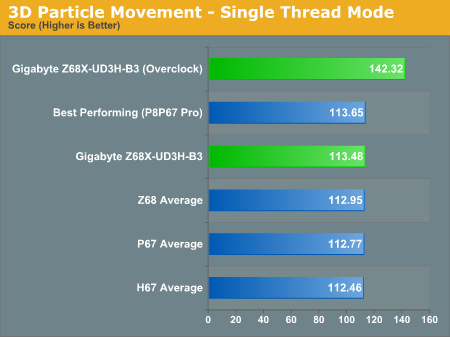
When we tested this motherboard using the single threaded benchmark, the UD3H did well - coming in at third place at both stock and overclocked speeds.
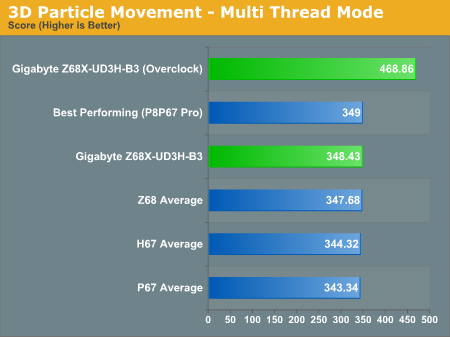
Using our multithreaded 3D Movement test with the CPU at stock settings, this is technically one of the fastest motherboards out of our database of Sandy Bridge motherboards. Sadly, it didn’t take top spot when the system was overclocked, which is probably down to the BCLK/multiplier limit of the board but it still performed above average.
WinRAR x64 3.93 - link
With 64-bit WinRAR, we compress the set of files used in the USB speed tests. WinRAR x64 3.93 attempts to use multithreading when possible.
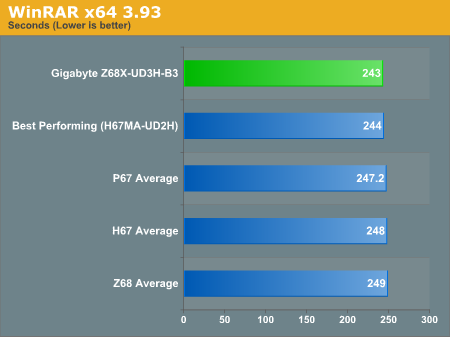
This is the fastest score we currently have on record.
FastStone Image Viewer 4.2 - link
FastStone Image Viewer is a free piece of software which allows quick viewing of flat images, as well as resizing, changing color depth, adding simple text or simple filters. It also has a bulk image conversion tool, which we use here. The software currently operates only in single-thread mode, which should change in later versions of the software. For this test, we convert a series of 170 files, of various resolutions, dimensions and types (of a total size of 163MB), all to the .gif format of 640x480 dimensions.
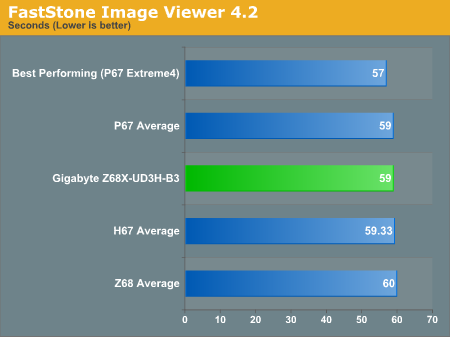
Neither a good nor a bad result - more or less bang in the middle here.
Sorenson Squeeze 6.0 - link
Sorenson Squeeze is a professional video encoder, complete with a vast array of options. For this test, we convert 32 HD videos, each a minute long and approximately 42 MB in size, to WMV 512KBps format. Squeeze can encode multiple videos at once, one for each thread.
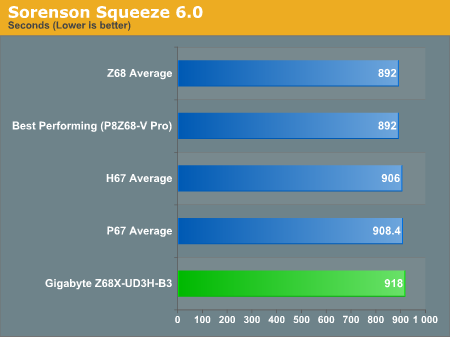
The second slowest score recorded whilst on the Sandy Bridge platform is quite unfortunate as this motherboard does do well in other aspects of our testing.










70 Comments
View All Comments
Meghan54 - Monday, July 11, 2011 - link
I have checked several publications, such as the MLA and APA manuals, and both are quite consistent with giving the recommendation that corp/company names be treated as singular entities, and has been this way for decades upon decades. Even going back to the grammar texts from the early 1950's shows this.....just happen to have some around from when my Mother taught school.Maybe you should check out some writing guides instead of depending upon "popular" and colloquial writing in magazines.
Exodus220 - Monday, July 11, 2011 - link
The Gregg Reference Manual, Ninth Edition, by William Sabin says that when using organizational names, treat them as either singular or plural (but not both). Ordinarily, it suggests you treat the name as singular unless you wish to emphasize the individuals who make up the organization. In that case, use the plural.Gregg uses these examples to make sure there’s subject-verb agreement:
Brooks & Rice has lost its lease. It is not looking for a new location. OR Brooks & Rice have lost their lease. They are now looking for…But NOT Brooks & Rice has lost its lease. They are now looking…
If the organization is referred to as “they” or “who,” use a plural verb with the company name. If the organization is referred to as “it” or “which,” use a singular verb.
Professor Charles Darling says, “The names of companies and other organizations are usually regarded as singular, regardless of their ending: ‘General Motors has announced its fall lineup of new vehicles.’ Try to avoid the inconsistency that is almost inevitable when you think of corporate entities as a group of individuals: ‘General Motors has announced their fall lineup of new vehicles.’”
Meghan54 - Monday, July 11, 2011 - link
No they're not. Corps. are treated as singular entities. Substitute for any corp's name, be it Intel, Gigabyte, Apple, et al, the word company, and you have your answer. You wouldn't say "The company have good products", would you?No, just like it's incorrect to say Intel have or Gigabyte have. A company, corporation, or any group is treated as a single entity. like Congress, Parliament, or any other cohesive group.
Learn English grammar.
mickyfinn - Wednesday, June 20, 2012 - link
I don't think so. Apparently, In the US and in England, Corporations apparently are treated as single nouns. This is correct as Corporations are viewed legally as single entities.I cite the following:
The Associated Press (ap.org) about us page http://www.ap.org/company/about-us: "The AP is one of the largest ... AP is neither privately held... AP employs the lastest..."
IBM press release http://www-03.ibm.com/press/us/en/pressrelease/379... entitled "IBM Completes Acquisition of Tealeaf Technology", first sentence: "ARMONK, N.Y. - 13 Jun 2012: IBM (NYSE:IBM) today announced IT (emphasis mine) has completed its acquisition of Tealeaf Technology, Inc., ..."
Financial Times website "about us": http://aboutus.ft.com/corporate-information/#axzz1... : "The FT IS... (emphasis mine)" and feel free to peruse any of their articles refering to corporations (or countries). All singular.
Oxford University Press release, http://www.ox.ac.uk/media/news_stories/2012/120614... entitled "Oxford Tops Times Good University Guide for 11th Year"
While the US and UK are not technically "most English-speaking countries", the English ostensibly invented the language and the US one the IP rights to it from them in a war in the 18th century.
mickyfinn - Wednesday, June 20, 2012 - link
oy... I mean "won". :(IanCutress - Monday, July 11, 2011 - link
I edited this article for Brendan - there's a UK/US split on whether a company should be singular or plural (I would cite web sources and style guides on this, but they are easy to find). I understand AT is a mainly US based web-site, and when concentrating to write in a US style it's frustrating to find that what both Brendan and I know is emphatically correct, others consider it totally wrong, and it sometimes creeps through unnoticed as a result. Our apologies.awaken688 - Monday, July 11, 2011 - link
Don't worry about it man. I personally prefer it be treated as a singular, especially when we are treating it as a single entity. But, I understand there are always going to be differences among English speaking countries. Just as someone was so sure of the horrible use of "an SSD" when in fact it is the correct use, people need to relax a little.MilwaukeeMike - Monday, July 11, 2011 - link
Everyone has their preferences...some we can argue over, some are just annoyances.. I personally hate the phrase 'that being said' (and its derivatives) because it's ambiguous and pointless, but I must be in the minority because of how often it's used.irreverence - Monday, July 11, 2011 - link
I'd not usually be bothered by something like this, and would generally find it to be fairly trivial, but upon reading the rest of this article it becomes incredibly clear that it is not fit for publishing and is in dire need of a proofreader. I do not know if Brendan's 1st language is English or not, but as his 1st article on the site this should really have been scrutinised by an editor before signing off on it.Aside from the issue with treating Gigabyte as a plural entity, here are just a few other issues with the writing that were immediately apparent upon reading:
- using the phrase "in my eyes" instead of "to my eyes"
- "with regards to" instead of "with regard to"
- "after comparing to" instead of "after comparing with"
- "one port which points out" instead of "one port that points out"
- "Gigabyte have put all of the features in their relative submenus that makes them easy to find." instead of "Gigabyte have put all of the features in their relative submenus which makes them easy to find."
- "it's in the center board" - "it's in the center of the board"
- "CPU, memory, graphics card(s) as well as..." instead of "CPU, memory and graphics card(s), as well as..."
Then there is the confusing inconsistency between the uses of "display port" and "DisplayPort".
Apart from all this, the whole article is littered with clumsy sentences. There are too many to quote directly, but by way of example:
"Unfortunately, the CPU core voltage isn’t displayed correctly by CPUZ which means you have to use the EasyTune6 software, which seems to do a better job although I wouldn’t rely on it entirely."
I'm sorry, but I expect higher standards of writing from this site. I don't blame the author directly, but the fact that this clearly hasn't been proofread is pretty bad.
The0ne - Monday, July 11, 2011 - link
People see it as a "trifle" but it really is annoying if used very often. It's breaks your train of reading/thought and eventually invokes the Hulk in anyone who cares :D But I've long trained myself to ignore such trifles as blogs, reviews and even news on the Internet are horrible to begin with. Now books are another matter :D